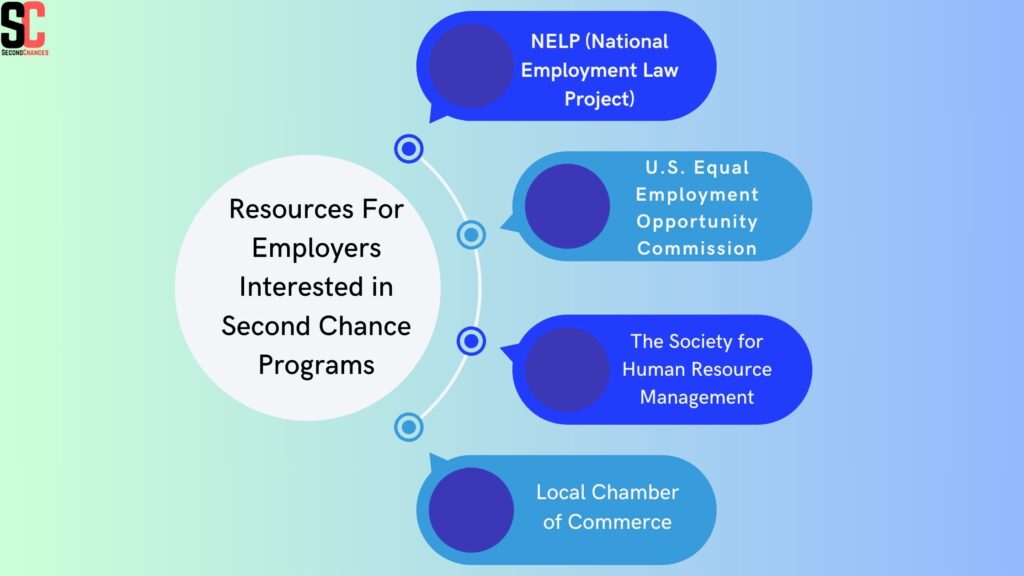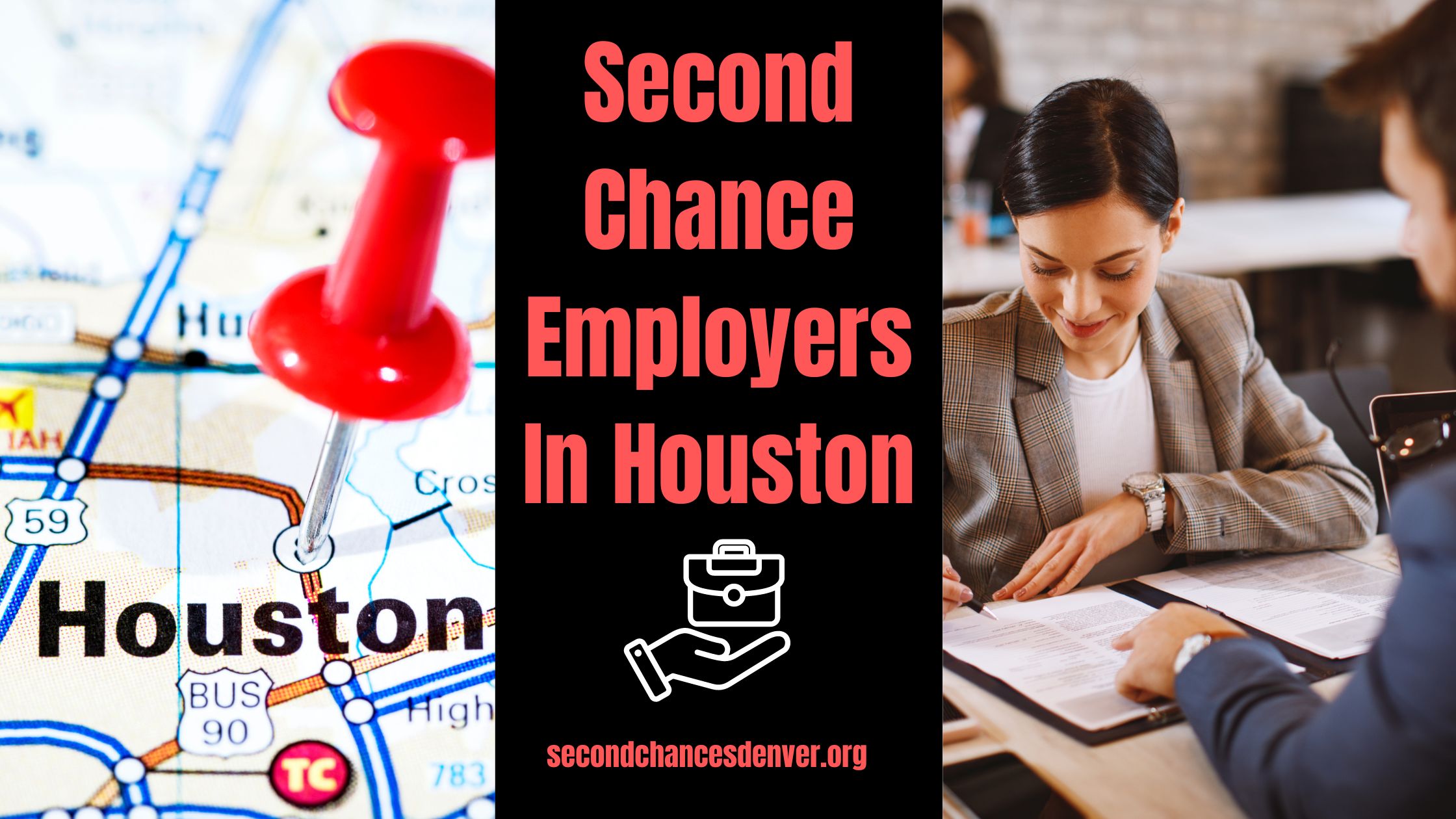Would you like to implement Second Chance Employers In Houston but are unsure how to proceed?
A second chance can benefit your company if you hire someone and give them a second chance. A second chance hiring scenario occurs when you hire someone who has a criminal record. This increases your hiring pool and allows you to attract talent you previously did not have access to.
A second chance hiring statistic reveals that approximately 70 million Americans have a criminal record, which makes reintegration into society a challenging process. Despite these challenges, about 600,000 citizens return from prison each year with a unique blend of talent, loyalty, and motivation.
This article will discuss everything you need to know about Second Chance Employers In Houston, their services, and how you can apply.
Let’s begin.
Table of Contents
What Are Second Chance Employers?
Second Chance Employers is an employer that practices second-chance hiring. Several large and influential companies are getting on board with second chances. A group of them has formed the Second Chance Business Coalition. SCBC recognizes its responsibility to offer employment and advancement opportunities to people with criminal records.
As a result, the membership list reads like a who’s who of American business, including companies such as JP Morgan Chase, Best Buy, Cisco, DICK’s Sporting Goods, General Motors, Home Depot, McDonald’s, Microsoft, Target, Proctor & Gamble, Verizon, Visa, Walmart, and a few others.
The concept of second chance hiring isn’t limited to large corporations. It is beneficial for small and medium-sized businesses to adopt this practice.
What is Second Chance Hiring?

The practice of hiring people with criminal records is known as second chance hiring. The hired benefits from this, but that’s not the only reason. At least 70 million Americans have criminal records. Some of these individuals have old offenses that don’t negatively affect their potential as workers. This group represents a large pool of talent that employers cannot ignore.
Nowadays, companies that become second chance employers can gain a competitive advantage when it comes to finding enough workers. There is no difference between ex-offenders and other employees in terms of human resources departments in these companies. A second chance usually makes them more loyal to the company that helped them.
Additionally, second chance hiring benefits society as a whole because it is good corporate citizenship. The chances of former offenders reoffending are reduced when they have a job. As a result, taxpayers are relieved of the cost of social services required by unemployed people.
What is Employment in Houston?
- Houston is home to 24 Fortune 500 Companies, and it is becoming an international city with a growing number of foreign missions and international companies.
- While Houston’s energy sector is one of its leading industries, there are many different job opportunities for expats.
- The state of Texas has no state income tax, making it one of only seven states without one. However, keep in mind that you are still subject to federal taxes.
- Houston’s workforce is highly motivated, and hard work is highly valued. A Houstonian’s workweek is one of the longest in the country.
How To Get Started As Second Chance Employers In Houston?

The decision to become Second Chance Employers is a big one, and it can be scary. You should follow these steps.
Research is Key
It is a good idea to conduct more research before hiring second-chance employees. Do you think it would have an impact on the culture of your company and other employees? You should be aware of the potential impact this may have on every aspect of your business. Do you plan on changing your recruitment strategies as a result?
Make A Proposal
Prepare a proposal for leadership to review. The proposal should outline what kind of second-chance employees you are looking for and which ones you are not. You are required to submit a written policy for inclusion in the employee handbook. Describe what would be changed in your recruitment and interviewing process. Your research on second chance employers and the benefits of becoming one should be shared.
Employee Communication
Ensure you inform your employees about your new hiring initiative as soon as you have leadership buy-in. Then, they can ask any questions or voice any concerns they might have. A second-chance employee shouldn’t know they are a second-chance employee, but honesty is important so they don’t seem blindsided when they discover someone has a criminal record. This can be included in the handbook so that new employees can communicate once it has been implemented.
Pros And Cons of Second Chance Employers In Houston
Pros of Second Chance Employers
Your first reaction may be to stop a candidate’s application or reject it altogether if the applicant has a criminal history. A record does not necessarily mean hiring them is a bad idea. The pros of hiring second chances are as follows.
- It has a massive talent pool. The number of people who have been arrested or convicted in the US is estimated to be 70 million. It can greatly enhance your talent pool to hire employees with a criminal record.
- The loyalty of second-chance employees is high. There is a lower likelihood of employees with criminal histories quitting. These employees are grateful for a second chance and will work harder than their colleagues.
- The tax break. Former felons can receive tax breaks as employees of employers.
State and federal governments offer these tax credits as part of the Work Opportunity Tax Credit (WOTC), which aims to incentivize employers to hire individuals from certain target groups, including veterans, individuals receiving government assistance, and Jobs for Felons That Offer a Good Second Chance.
Cons of Second Chance Employers
There are many benefits to hiring employees with criminal records, but there are also risks.
- A recidivism rate. There is a risk of relapsing for employees with criminal histories, especially when they violate probation or parole. When an employee is convicted while working, it creates a negative impression of your company and makes your employees feel unsafe.
- There is a danger at work. The employee could put other employees at risk if they relapse or behave the same way as before. An employee’s criminal history should remain confidential, but if other employees learn about another employee’s criminal history, they may feel unsafe. A criminal history might make employees reluctant to work with that employee.
- There are trust issues. The hiring manager or you may find it difficult to trust a second-chance employee who sincerely desires to change because of their criminal history. As a result, the relationship may be strained, or the employee may be treated differently.
Useful Hiring Tips For Second Chance Employers In Houston
The first time your company hires a second chance candidate, you need to take a strategic and thoughtful approach. Here are four practical tips employers can use to encourage candidates with past challenges to apply.
Do More Research
If you want to make sure that your hiring process is fair, consider expanding your recruitment strategies. Take advantage of resources such as the American Job Center and local reentry service providers to learn about training programs, job fairs, and job postings tailored to those with criminal records. There are many nonprofits that host reentry job fairs that provide valuable networking opportunities.
You can broaden your reach by posting job descriptions not only on your company’s website but also on global job boards and platforms that target candidates with prior convictions. Make your job titles and descriptions more visible by using terms like “fair chance hiring” or “second chance hiring.” It is common for job seekers to use phrases like these when searching on search engines or job boards to find relevant opportunities more easily.
Invest in Career Advancement
The key to fair chance hiring success is providing new employees with support and resources through a strong orientation program. Consider reentry programs that offer career training options offered by your state, local government, or nonprofit organization. Your budget may allow you to provide professional development stipends for all employees, allowing them to attend training classes, obtain certifications, and pay tuition.
Second-chance employees may need some time to adjust to work life after returning to the workforce. The second-chance employee can also be mentored for training to ease this transition and ensure he or she adjusts well to the workplace.
Make Transparency Confidential
Second-chance employers must be transparent with their employees about their hiring philosophy. It’s important to note that this transparency does not mean disclosing the criminal histories of individual employees. You can create understanding among your workforce by being open about your commitment to giving second chances without drawing unnecessary attention to past mistakes.
Provide A Supportive Environment
A supportive and inclusive company culture is crucial if you want second-chance new hires to thrive at your workplace. The goal is to prevent them from feeling like outsiders or different from their colleagues. These simple actions can make a big difference for these employees:
- New hires, including those with a second chance, should feel valued and included.
- Make sure everyone feels heard and understood by encouraging dialogue.
- Foster a positive work environment by acknowledging achievements, no matter how big or small.
- Make second chance hires feel welcome by organizing team-building activities.
Resources For Employers Interested in Second Chance Programs

Various resources are available to employers interested in establishing or expanding second chance programs. Here is a list of key organizations and websites that can provide information and assistance:
NELP (National Employment Law Project)
The organization conducts research, analyzes policy, and advocates for workforce development and employment law issues. A “Second Chance Employer Toolkit” was published on criminal background check policies and second-chance hiring.
The U.S. Equal Employment Opportunity Commission
As the federal agency responsible for enforcing antidiscrimination laws in the workplace, the EEOC is entrusted with enforcing them. They have published guidelines on the use of criminal background checks by employers, which include information on when they may be illegal.
The Society for Human Resource Management
The SHRM is the largest professional association for HR professionals in the world. A template policy for conducting criminal background checks is included in their library of resources on background checks and hiring.
Local Chamber of Commerce
Several local chambers of commerce offer workforce development programs and services, including assistance in recruiting and hiring individuals with criminal backgrounds.
There may also be programs in your local area (such as a second chance business coalition) that can help incarcerated individuals with job applications, interview scheduling, and criminal justice reform. You can also inquire about work opportunity tax credit laws, Title VII, and other matters with your legal and financial departments.
Challenges In Establishing Second Chance Employers Hiring
There are several barriers you may encounter as Second Chance Employers In Houston, including:
- A concern is that individuals with criminal backgrounds may pose a greater risk of violence or disruption at work.
- A belief that people with criminal records are less trustworthy and reliable than other employees.
- An employee with a criminal background may be held liable if they engage in criminal activities at work.
- Conducting background checks on prospective hires can be expensive and time-consuming.
- Make sure you understand your candidates better, develop a strong business case to address concerns, and carefully consider the nature of the work involved. The value of second-chance hiring should also be assessed against the organization’s needs.
FAQs
What is Second Chance Hiring?
Second chance hiring refers to giving people with criminal records a fair shot at being hired by evaluating their skills before requesting criminal background information.
Can I Consider Criminal Convictions?
It is still possible to hire a candidate with a criminal conviction under a fair chance hiring policy. It is advisable to ask for criminal history information later in the hiring process and to evaluate the record on an individual basis.
How Long Does A Background Check Take In Houston?
The duration of a background check varies depending on the method used.
The process of gathering the required information may take several weeks if you decide to conduct your own background check.
Conclusion
The workforce available to second chance employers is much larger than the one they would otherwise overlook. The quality of work performed by ex-offenders is generally equal to or better than that of other employees, and they are extremely loyal. A second chance hire is not an act of altruism but rather an opportunity to select the best candidate for the job from a broader pool of applicants. Second chance hiring is most successful when done thoughtfully and methodically, adhering to best practices.


